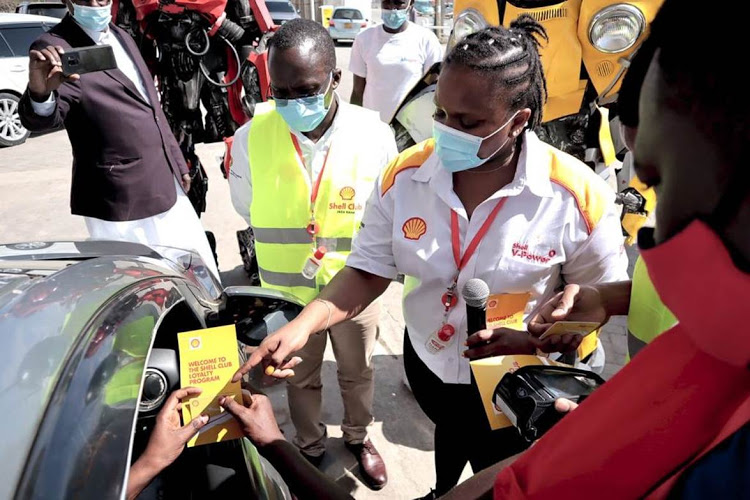Vivo Energy Kenya MD Managing Peter Murungi and Sandra Mutua engage recruit a customer onto Shell Club, during the launch of Shell Sabaki station on November 13 Vivo Energy, the company behind the Shell brand in Kenya outsold its rivals to maintain market leadership despite a subdued market occasioned by the Covid-19 pandemic.
The Petroleum Institute of East Africa third-quarter market report shows Vivo grew its overall market share to 18.5 per cent during the period compared to an average of 15 per cent in the last two previous quarters.
Total Kenya is second with a 1.43 per cent marginal growth, closing at an overall market share of 15.01 per cent while Rubis Energy emerged third, recording a market share of 9.01 per cent.
Vivo Energy increased its Kenya petroleum market share by 2.38 per cent to 24.6 per cent, followed by Total Kenya who reported a growth of 2.05 per cent to 18.81 per cent.
Rubis Energy took the third position with its market share shrinking to 9.01 despite a heavy rebranding after taking over KenolKobil and Gulf Energy stations.
Vivo also commanded the petroleum retail business, pushing up its market grip by almost 100 basis points to 32.1 per cent from 31.4 per cent in the previous quarter.
The report attributes the growth to a huge network footprint and a strategic customer-focused recovery plan that Vivo Energy has implemented during this pandemic year.
In the aviation sector, Rubis Energy remains the market leader but experienced a drop of 4.7 per cent to 51.6 per cent.
Kenya petroleum sales volumes have doubled in the past 10 years, moving from 2.8 million litres to 5.7 million last year with Super petrol growing steadily at almost five-fold and at 2.4 times the industry growth rate.
Diesel has had a steady growth of 1.8 times but went experience a slow uptake beginning in 2017 while JET grows at 1.3 times, way below the industry growth rate.
According to the report, Kerosene sales declined by 28 per cent due to the tough tax regime on the product in the fight against Covid-19.Vivo Energy Kenya MD Peter Murungi said despite a challenging year, they have been deliberate and optimistic in actualising a consumer-centric recovery plan.”The improvements we have made this quarter are glimpses of deliberate Covid-19 initiatives we developed and invested in. We believe that our solid recovery plan coupled with agility and a positive business environment mindset will enable us to yield […]
